The UK’s centre-left Labour government has announced plans to end the tax exemption for private schools, a decision projected to generate over £1.5 billion ($1.9 billion) annually for public education.
Finance Minister Rachel Reeves on Sunday said that this change will take effect on January 1 and introduce a 20% value-added tax (VAT) on private school tuition fees. The additional revenue will fund thousands of new teaching positions and enhance state school standards.
Reeves added that this is for the benefit of 94% of the country’s children who receive education in State Schools.

This policy, a cornerstone of Labour’s election platform, was formally included in the October budget. It hopes to raise £1.5 billion for the 2025/2026 school year, with revenues expected to grow to £1.7 billion annually by 2029/2030. These funds will support the hiring of 6,500 new public school teachers.
Currently, private school tuition fees average £18,000 per year, according to the Independent Schools Council. Fees are expected to rise by around 10% as schools absorb part of the new tax burden.
Critics of the reform argue that a surge in state school enrolment could drive up costs for the government if private schools become less accessible. However, studies counter this claim. The Institute for Fiscal Studies predicts that state school enrolment will decline by 2030 due to a shrinking student-age population.
Research also highlights that the gap between private and state school outcomes widened significantly during 14 years of Conservative governance.
Labour, which secured a landslide victory in the July election, campaigned on promises to bolster economic growth and revitalize public services. This tax policy is one of its first major steps toward delivering on those commitments.


